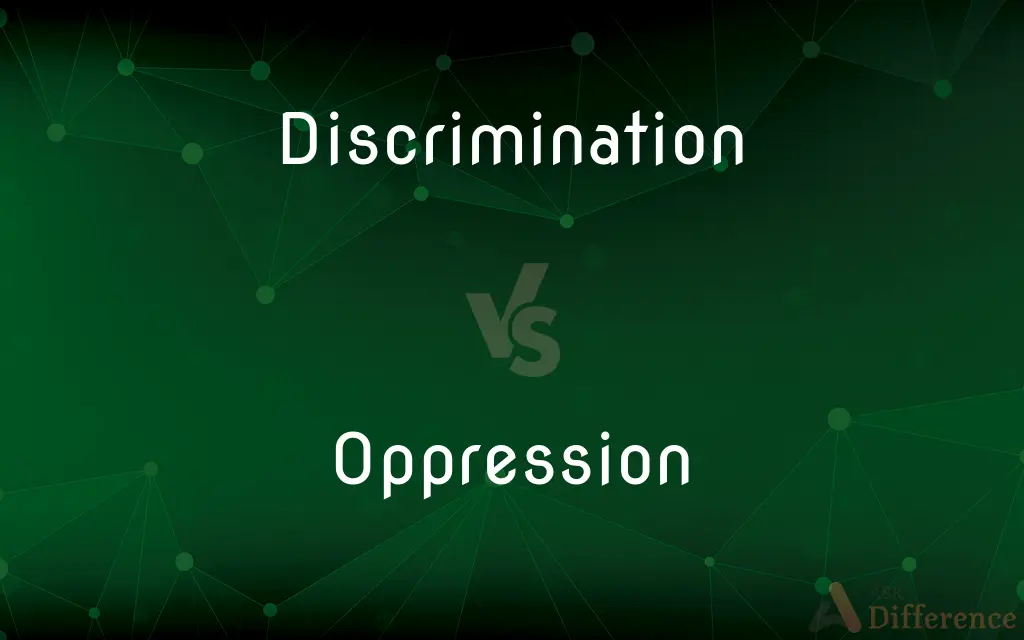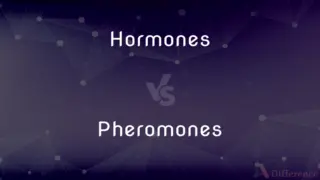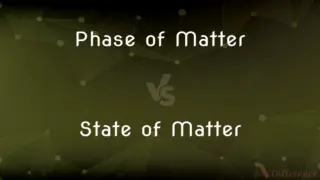Discrimination vs. Oppression — What's the Difference?
By Tayyaba Rehman — Published on November 9, 2023
Discrimination involves treating someone unfairly based on specific characteristics, while oppression is systematic, widespread injustice within a society.

Difference Between Discrimination and Oppression
Table of Contents
ADVERTISEMENT
Key Differences
Discrimination and oppression, while interconnected, manifest in various capacities in a society. Discrimination refers to the unjust treatment of different categories of people, typically on the grounds of race, or age. Oppression, conversely, involves a systemic level of discrimination and injustice, wherein a particular group exercises authority and power over another, often employing harsh and unjust treatments.
While discrimination can be exhibited in both subtle and overt manners, oppression is, by nature, an overt and well-established system that functions in various sectors of a society. Discrimination might be experienced on an individual level, such as being denied a job due to age. Oppression, however, is more encompassing and is often inscribed in laws, cultural practices, and social systems, subjugating particular groups consistently and across various contexts.
Discrimination, in various instances, can be tackled through policies, legal frameworks, and social campaigns that advocate for equality and fair treatment. Oppression, meanwhile, often requires a more comprehensive upheaval of societal norms, legislations, and sometimes, entire governmental or societal structures to effect tangible, long-term change, as it is deeply rooted within the societal system.
In contexts where discrimination is present, it may be possible to seek recourse through legal means, assuming the discriminatory act is outlawed or protected against within that jurisdiction. Oppression, conversely, is often so embedded within the legal and societal structure that seeking legal recourse might be ineffectual or incredibly challenging, requiring collective actions and movements to instigate change.
Both discrimination and oppression can have profound, long-term impacts on individuals and communities, affecting mental health, opportunities, and societal participation. Addressing both requires not only systemic interventions but also cultural and societal shifts toward equality, equity, and justice in all facets of society.
ADVERTISEMENT
Comparison Chart
Definition
Unfair treatment based on specific characteristics
Systematic, widespread injustice and unfair treatment
Scope
Can be individual or systemic
Primarily systemic and pervasive
Recourse
May be addressable through legal means
Often deeply embedded in legal and societal systems
Level
Can exist at various levels within a society
Operates at a systemic level in society
Resolution
Can potentially be resolved with policies
Typically requires a profound societal shift
Compare with Definitions
Discrimination
Biased or prejudiced treatment.
She faced discrimination due to her religious beliefs.
Oppression
Systematic subjugation of a group.
The oppression of the working class is historically widespread.
Discrimination
Unjust consideration of a category.
Disability discrimination limits opportunities for many.
Oppression
Widespread control and subjection.
Oppression often perpetuates cycles of poverty and inequality.
Discrimination
Differentiation based on particular attributes.
Age discrimination in employment is illegal in many places.
Oppression
Continuous cruel or unjust treatment.
Generations have resisted the oppression of dictatorial leaders.
Discrimination
Unfair treatment based on prejudice.
Racial discrimination still pervades many societies.
Oppression
Exerting authority over groups unjustly.
Cultural oppression minimizes the presence and contributions of minority groups.
Discrimination
The act of discriminating.
Oppression
Pervasive injustice within a society.
Many fight against the oppression embedded in authoritarian regimes.
Discrimination
The ability or power to see or make fine distinctions; discernment.
Oppression
The action of oppressing; arbitrary and cruel exercise of power
A system of oppression.
Discrimination
Treatment or consideration based on class or category, such as race or gender, rather than individual merit; partiality or prejudice.
Oppression
The state of being oppressed
Caught in the oppression of poverty.
Discrimination
Discernment, the act of discriminating, discerning, distinguishing, noting or perceiving differences between things, with the intent to understand rightly and make correct decisions.
Oppression
A feeling of being weighed down in mind or body
"Every time I entered my house, an oppression settled on me so heavy that I had to stand for minutes at a time in the doorway, gathering what strength I could find" (Erin McGraw). "One has ... to come under the shadow of war to feel fully its oppression" (J.R.R. Tolkien).
Discrimination
Differential treatment of an individual or group to their disadvantage; treatment or consideration based on class or category rather than individual merit; partiality; prejudice; bigotry.
Reverse discrimination
Oppression
The exercise of authority or power in a burdensome, cruel, or unjust manner.
Discrimination
(uncountable) The quality of being discriminating; acute discernment, especially in matters of good taste.
Oppression
The act of oppressing, or the state of being oppressed.
Extreme freedom is followed by extreme oppression, said Plato.
Discrimination
That which discriminates; a distinguishing mark, a characteristic.
Oppression
A feeling of being oppressed.
Our oppression was lifted by the reappearance of the sun.
Discrimination
The act of discriminating, distinguishing, or noting and marking differences.
To make an anxious discrimination between the miracle absolute and providential.
Oppression
The act of oppressing, or state of being oppressed.
Discrimination
The state of being discriminated, distinguished, or set apart.
Oppression
That which oppresses; a hardship or injustice; cruelty; severity; tyranny.
Discrimination
The arbitrary imposition of unequal tariffs for substantially the same service.
A difference in rates, not based upon any corresponding difference in cost, constitutes a case of discrimination.
Oppression
A sense of heaviness or obstruction in the body or mind; depression; dullness; lassitude; as, an oppression of spirits; an oppression of the lungs.
There gentle SleepFirst found me, and with soft oppression seizedMy drowsed sense.
Discrimination
The quality of being discriminating; faculty of nicely distinguishing; acute discernment; as, to show great discrimination in the choice of means.
Oppression
Ravishment; rape.
Discrimination
That which discriminates; mark of distinction.
Oppression
The act of subjugating by cruelty;
The tyrant's oppression of the people
Discrimination
Unfair treatment of a person or group on the basis of prejudice
Oppression
The state of being kept down by unjust use of force or authority:
After years of oppression they finally revolted
Discrimination
The cognitive process whereby two or more stimuli are distinguished
Oppression
A feeling of being oppressed
Discrimination
Selective unjust treatment.
Gender discrimination perpetuates harmful stereotypes.
Common Curiosities
How is oppression maintained in society?
Oppression is often maintained through systemic, legal, and cultural norms.
What defines discrimination?
Discrimination involves unfair treatment based on specific attributes like race, gender, etc.
Are discrimination and oppression interlinked?
Yes, discrimination can be a tool or outcome of oppression.
Can oppression exist without discrimination?
Typically no, as oppression often utilizes discrimination to exert control.
Who is susceptible to discrimination?
Anyone, depending on the societal context and prevalent biases.
Can discrimination be legal?
While often illegal, discriminatory practices can persist, sometimes protected by flawed laws or enforcement.
Why is oppression systemic?
Because it infiltrates various sectors of society, affecting laws, norms, and structures.
Can discrimination lead to oppression?
Yes, pervasive discrimination can contribute to systemic oppression.
How can oppression be dismantled?
Through systemic changes, activism, and reshaping societal norms and structures.
Can discrimination be unconscious?
Yes, discrimination can manifest as unconscious bias.
How to report discrimination?
Methods vary, but may involve legal actions, reporting to authorities, or utilizing organizational protocols.
Can discrimination be positive?
Some argue "positive discrimination" or "affirmative action" can counterbalance historical inequalities.
Who usually perpetrates oppression?
Those in power, whether they be governmental, social, or institutional entities.
Can individuals enact oppression?
Individuals can contribute to or reinforce oppression, but it is systemic and larger than singular actions.
What are the consequences of oppression?
Oppression can lead to widespread inequality, unrest, and diminished opportunities for the oppressed.
Share Your Discovery

Previous Comparison
Hormones vs. Pheromones
Next Comparison
Phase of Matter vs. State of MatterAuthor Spotlight
Written by
Tayyaba RehmanTayyaba Rehman is a distinguished writer, currently serving as a primary contributor to askdifference.com. As a researcher in semantics and etymology, Tayyaba's passion for the complexity of languages and their distinctions has found a perfect home on the platform. Tayyaba delves into the intricacies of language, distinguishing between commonly confused words and phrases, thereby providing clarity for readers worldwide.













































